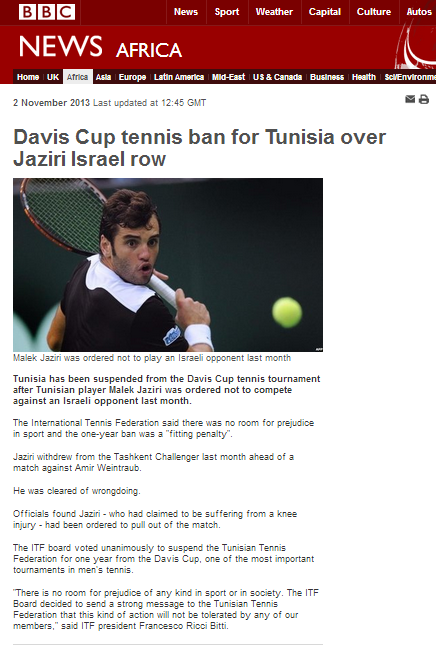A filmed report titled “Israeli news presenter gets tearful reporting own show’s cancellation” appeared on the BBC News website’s Middle East page on May 10th and remained there for seven consecutive days. The report’s synopsis tells BBC audiences that:
“Presenter Geula Even was unable to hold back her tears after learning while on air that it would be her last show on Israel’s Channel One television. […]
Presenters and reporters of another show later complained that they had been denied a dignified farewell.”
A written report (including the above video) on the same topic – “Israeli TV channel’s sudden closure shocks staff” – also appeared on the website’s Middle East page on May 10th and 11th.
“Israel’s longest-running TV news programme came to an emotional end on Tuesday, hours after its staff were told of their network’s sudden closure.
Presenters of Mabat LaHadashot (A Glance At The News) on Channel One complained of being denied a dignified farewell after 49 years on air.
An earlier show’s presenter choked back tears after learning of the news.”
The subtitles added by the BBC to the filmed report translate Geula Even’s opening sentences as follows:
“We are now getting news, a statement in parliament….Actually tonight will be our last news programme.”
The presenter (who, incidentally, already signed up to work for the new corporation in March) actually said:
“…because now arrives an announcement from the Official Receiver and Liqudator – from David Han – in the Knesset that actually this evening the last edition of the ‘Mabat’ programme will be broadcast. That is due to the wish [unintelligible] the [replacement] corporation to meet its opening day.”
As we see, the BBC has erased the fact that the Israel Broadcasting Authority (IBA) was in receivership for several years from audience view.
The written article similarly makes no mention of the background information crucial to understanding of this story. Readers are told that:
“The cancellations came as parliament approved the closure of the state-run Israel Broadcasting Authority (IBA).
It will be replaced with a new, smaller entity known as Kan on Monday.
The IBA was established in 1948 and held a monopoly on TV and radio broadcasts in the country until the 1990s. Like the BBC, it was funded mainly by licence fees.
In 2014, Prime Minister Benjamin Netanyahu’s government announced that the IBA would be replaced with a new public broadcaster that would be less costly.”
In fact, in August 2014 the Knesset as a whole passed the Public Broadcasting law which paved the way for reforms including the closure of the IBA, the establishment of the new – and much less costly – broadcasting corporation and the abolition of the licence fee. Following the passing of that law, the Official Receiver and Liquidator was appointed to oversee dismantling of the IBA and to manage it throughout the process.
The BBC’s written report presents the story to readers as being solely political.
“Opponents expressed concern that Mr Netanyahu, who has accused IBA journalists of being overly critical of his right-wing coalition, wanted to control the media.
The setting up of Kan was delayed repeatedly and almost abandoned in March.
Mr Netanyahu reportedly wanted it scrapped because he was concerned that two officials appointed to senior positions in the new broadcaster were left-leaning. However, the leader of another party in his coalition, Finance Minister Moshe Kahlon, insisted on pressing ahead.
The dispute, which almost led to an early general election being called, was resolved after it was agreed that the two officials would not oversee news.”
BBC audiences are not however told of the numerous unsuccessful attempts throughout the last decade to reform the IBA in light of over staffing, exceptionally high salaries, excessive control by unions, inefficiency, low ratings and abuse of public funding.
In other words, while focusing audience attentions on the political aspect of this domestic Israeli story, the BBC erased from view the no less relevant saga of a bloated, inefficient, low quality, unpopular public broadcaster that many view as having abused both public funding and its funding public.




